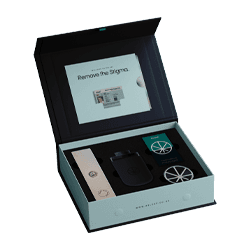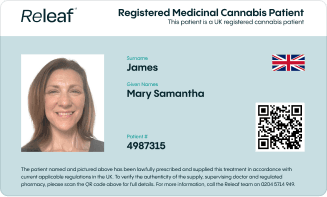But what about those who want to take a more hands-on approach and cultivate their own medical cannabis? Is it possible to get either a commercial or private medical cannabis cultivation licence in the UK?
Let's have a quick look at what medical cannabis is exactly here in the UK and dig into the legislation to see what the requirements and steps are for obtaining a medical cannabis cultivation licence in the UK.
What is medical cannabis?
Firstly, let's clarify the difference between medical and recreational cannabis.
Medical cannabis treatment refers to cannabis that is administered specifically for medicinal purposes under the supervision of a doctor, while recreational cannabis typically refers to the use of cannabis for nonmedical purposes.
Medical cannabis is different from its recreational counterpart. In terms of the specific strains and chemical composition offered, and the regulatory framework surrounding the industry. Unlike street-bought cannabis, it is grown at a medical cannabis farm under strict conditions, monitored for quality and consistency, and its application is overseen by medical professionals. This applies to all cannabis-based medical products, not only the dried flowers.
This ensures that patients receive a regulated and specific dosage of the appropriate cannabinoid/terpene for their condition. Here in the UK, the medical cannabis industry is subject to extremely stringent regulations, enforced by the governing body to ensure the safety and efficacy of medical cannabis products.
How was medical cannabis legalised?
In the summer of 2018, an urgent review of cannabis-based medicinal products took place. This led to the Advisory Council on the Misuse of Drugs (ACMD) and the UK’s Chief Medical Officer to implement changes to the medical cannabis legalisation that would allow expert doctors to issue prescriptions to patients who they decided could benefit from medical cannabis treatments.
It was recommended that the new law would not limit the types of conditions that can be considered for treatment. This allowed specialists to make decisions on prescribing cannabis-based products for medicinal use on a case-by-case basis, where patients are deemed to have special clinical needs that have not been met by traditional licensed medical products.
This meant that doctors who are on the General Medical Council (GMC) Specialist Register no longer needed to seek approval from expert panels in order to offer their patients access to cannabis-based medicines.
What did the UK Government review find?
A full government review of the legal status of medical cannabis took place in 2018 and was conducted in two parts.
Part one was overseen by the then Chief Medical Officer, Professor Dame Sally Davies, who reviewed the existing evidence for the application of cannabis-derived medicinal products. She concluded that there was
"sufficient evidence of the therapeutic benefits of medical cannabis products for a range of medical conditions to be able to recommend that the class of medical cannabis be moved out of Schedule 1"
Part two of the review was conducted by the Advisory Council on the Misuse of Drugs (ACMD) who went on to agree that cannabis-derived medicinal products that reached a required medical standard should no longer be subject to ‘Schedule 1’ requirements and could be re-classified and moved into Schedule 2.
This Schedule 1 reclassification opened the door for easier and wider access to medical cannabis prescriptions, officially changing the legal status of cannabis in the UK and opening up the potential for a new market in the production of licensable cannabis products.
Does this mean that anyone can legally grow medical cannabis in the UK?
Absolutely not. Private cannabis cultivation, medical or not, remains illegal under UK law. The penalties relating to illegal private cannabis cultivation include up to 14 years imprisonment, an unlimited fine, or both.
Medical cannabis can only be prescribed to patients by doctors who are on the General Medical Council (GMC) Specialist Register, which is then sourced through a pharmacy that is licensed to dispense controlled medicines.
Commercial cannabis cultivation licences are available, but with many strict requirements and regulations that must be met. These licences are granted by the Home Office, which has strict controls in place to ensure that only individuals and companies with the appropriate knowledge, skills, and track record are given the responsibility of producing medical cannabis.
Is it possible to obtain a commercial medical cannabis cultivation licence in the UK?
Yes, it is possible to obtain a commercial medical cannabis cultivation licence in the UK, but it is not a straightforward process.
Companies looking to manufacture cannabis-based medicinal products need to seek authorisation from two regulatory bodies – the MHRA and the Home Office. The burgeoning medical cannabis cultivation market has forced some changes to the overall process of applying for these licences.
Why?
The Home Office issues what are referred to as Controlled Drugs (CD) licences. This is the main licence required for commercial cannabis cultivation and supply, but to receive this licence, historically companies needed to have already received a manufacturing licence from the MHRA.
And this is where the issue arises.
The licences needed for commercial cannabis cultivation in the UK explained
To be eligible for the MHRA manufacturing licence, companies are required to fully demonstrate their ability to manufacture their product consistently and correctly. Prior to issuing a controlled drugs licence, the Home Office requires assurance that a company is capable of meeting the requirements set forth by the MHRA. So, this points to the fact that the MHRA licence must be issued first, right?
Yes, but new medical cannabis cultivation companies are unable to fulfil all the necessary processes required for the MHRA without first handling the 'controlled substances', and they can’t handle them until they hold a Home Office licence. All of this created a bit of a "catch-22" situation…
So, what was the solution?
As the medical cannabis industry grew, and this matter came to attention, the MHRA and the Home Office began to explore ways in which they could jointly approve companies that meet the industry's requirements while satisfying the regulatory needs of both government departments simultaneously. Thankfully, they have come to a resolution, with several companies now being granted these licences and paving the way for a safer and more transparent medical cannabis industry in the UK.
For a full explanation of this process, please head over to this UK government blog link. There is also this 22-page report that explains the MHRA licencing process in detail.
How much does this process cost?
The application fee for cannabis cultivation, which is the Home Office controlled drugs licence, currently stands at £4,700. On top of this, all sites that are looking to produce medical cannabis with a THC percentage of more than 0.2% must have a compliance visit.
The compliance visit cost comes at a cost of £1,371. The licence lasts for three calendar years, meaning all licences end on 31 December. This should be taken into consideration when planning your business operations, as a renewal will be required at this time, and the application process should be started as early as possible to ensure the longest licence period possible.
The MHRA’s manufacturing licence fees for new businesses stand at £6,019, which covers both the application fee (£3,457) and the assessment fee (£2,562). Then there is the annual compliance report, which costs £283 unless there is a variation required, in which case it will set you back £565.
So, as we can see, the licensing fees alone can be quite hefty, making it a substantial investment for companies looking to enter the medical cannabis cultivation industry in the UK. However, with the potential for a lucrative and exponentially expanding market and increased accessibility for patients, it could prove to be a wise investment overall. Plus, with the recent changes to the licencing process mentioned above, it is becoming more feasible for new companies looking to enter the market.
How much does medical cannabis farm insurance cost?
How long is a piece of string? Insurance costs vary significantly from business to business. With the industry still in its infancy, there are not yet many companies offering specialised medical cannabis cultivation insurance.
However, some brokers do offer policies, and we expect to see more options on the market as the industry grows. As with any insurance policy, it is essential to shop around and compare prices and coverage thoroughly before making any decisions.
The larger the scale of the operation, the higher the risk, and ultimately, the higher your insurance will cost. To get an accurate quote for your specific business operations, it is best to speak with a specialist insurance broker who has experience with medical cannabis farm coverage and can assess your unique situation and provide you with tailored recommendations. As a rough estimate, however, expect to pay several thousand pounds for full coverage.
You may have to employ the services of multiple insurance companies to cover all aspects of your business, such as product liability, equipment, crops, facilities, personnel, and professional indemnity. It is essential to ensure you have adequate coverage to protect your business and its operations, as this will be a crucial factor in obtaining the necessary licences.
UK medical cannabis cultivation FAQs
What is the difference between Schedule 1 and Schedule 2 cannabis classifications?
Schedule 1 drugs are considered to have no medicinal value and cannot be prescribed or legally possessed in the UK. This classification includes substances such as heroin, LSD, and MDMA.
Schedule 2 drugs are defined as having potential medical benefits (but also a high risk of abuse and addiction). These drugs can be prescribed by doctors in certain circumstances, with restrictions on possession and supply.
There is a current push underway to have cannabis further declassified from Schedule 2 to Schedule 3, which would allow all doctors to prescribe it without additional approvals. There is also a large subsection of the population that hopes that recreational cannabis will, one day, become a legal reality here in the UK.
Can I legally grow my own medical cannabis at home in the UK?
No, it is currently illegal for individuals to grow their own medical cannabis in the UK. All cultivation must be done under a Home Office licence and meet strict regulatory requirements. Only commercial entities with the necessary licences are permitted to cultivate and supply medical cannabis.
How long does the MHRA licencing process take?
This is a case-by-case basis, but typically it can take up to 9 months to receive a decision from the MHRA on your application. It is essential to thoroughly prepare and provide all necessary information and documentation before submitting an application to avoid any delays.
What are the current restrictions on medical cannabis cultivation in the UK?
Cultivation must be done under strict regulations and meet certain conditions, such as having a limited THC percentage and adhering to Good Manufacturing Practices (GMP). There are also restrictions on where medical cannabis can be grown and who is eligible for licences.
Can I apply for an MHRA licence if my company is based outside the UK?
Yes, it is possible for companies outside the UK to apply for an MHRA licence, but they must have a presence in the country and meet all the necessary regulatory requirements. It is also essential to note that licences are only valid within the UK and do not extend internationally.
Conclusion
Securing a medical cannabis cultivation licence in the UK is a complex and expensive process and is only available to commercial producers. It remains illegal for individuals to grow their own medical cannabis, and there are no plans for this to change, at least in the foreseeable future.
However, with the recent changes to regulations and licensing processes, it is becoming more achievable for new businesses looking to enter the market. The fees for both Home Office controlled drugs licences and MHRA manufacturing licences can add up to several thousand pounds, but with the potential for securing a lucrative market share in an emerging and booming industry, many see it as a worthwhile investment. It is crucial to keep in mind that the licensing process can be lengthy, so planning every aspect of the application process is essential for success.
Releaf understands the importance of medical cannabis in treating various medical conditions. With our tailored monthly packages, specialist consultations for medical cannabis, and a unique medical cannabis card for protection, you can access the treatment you require without worrying about the stigma.
To learn more, check out our extensive blog and education sections.





